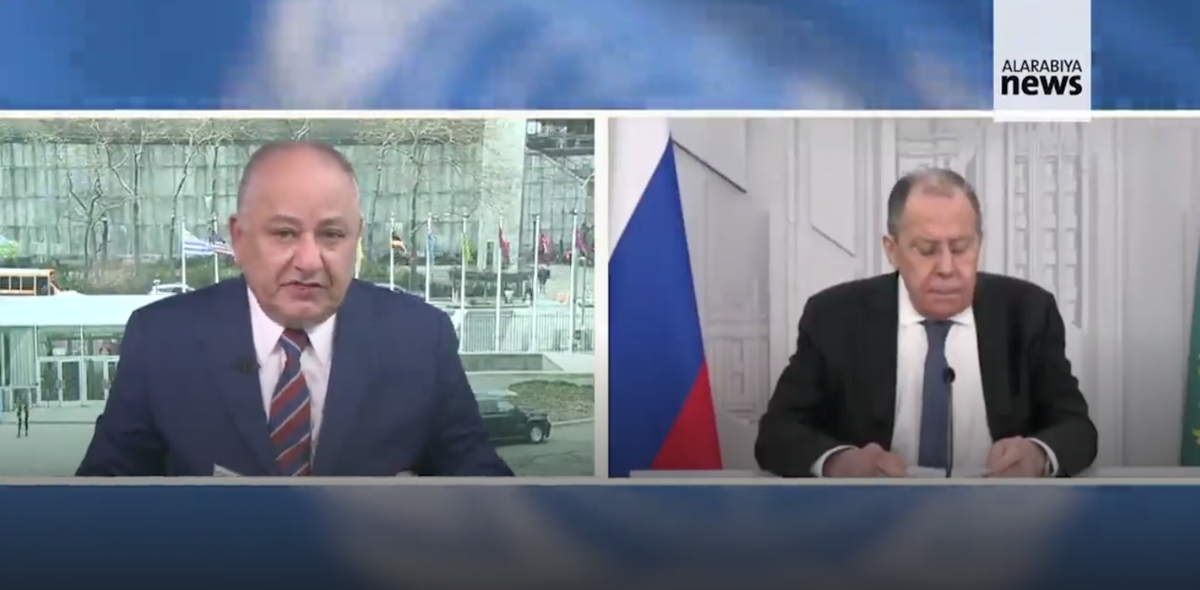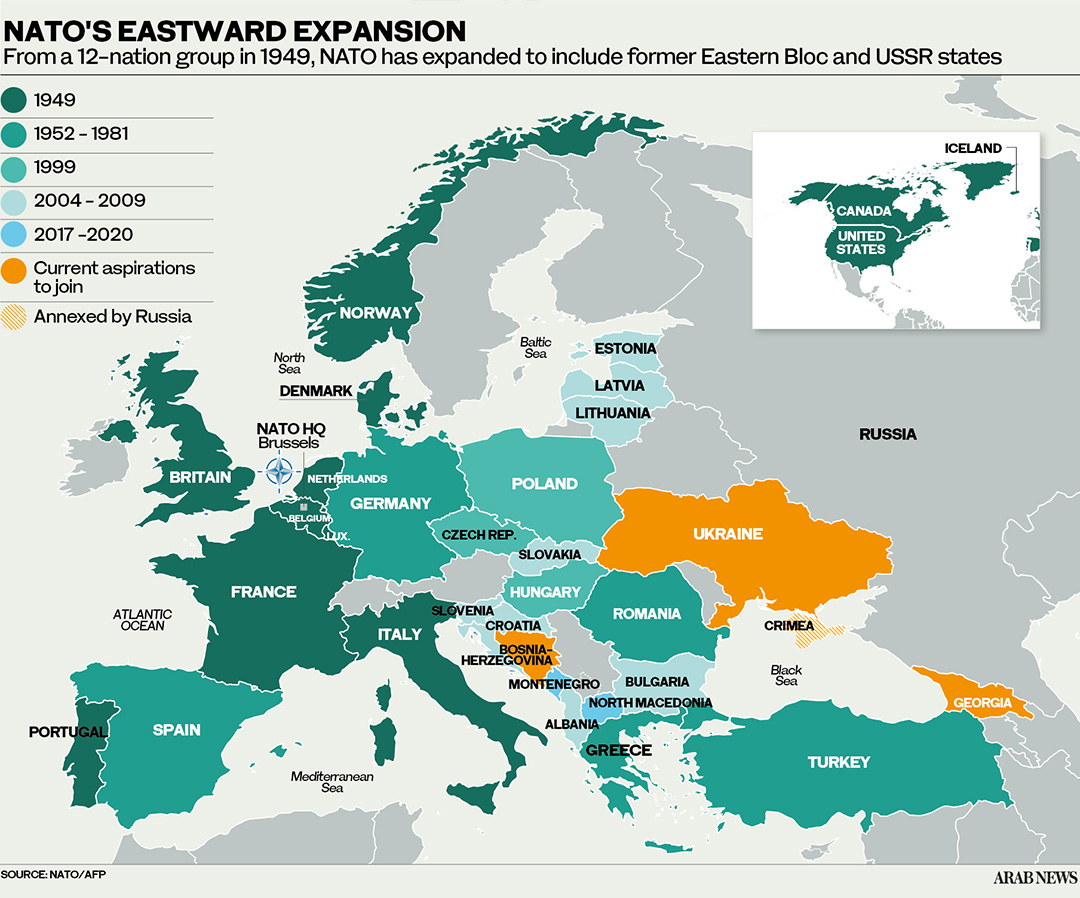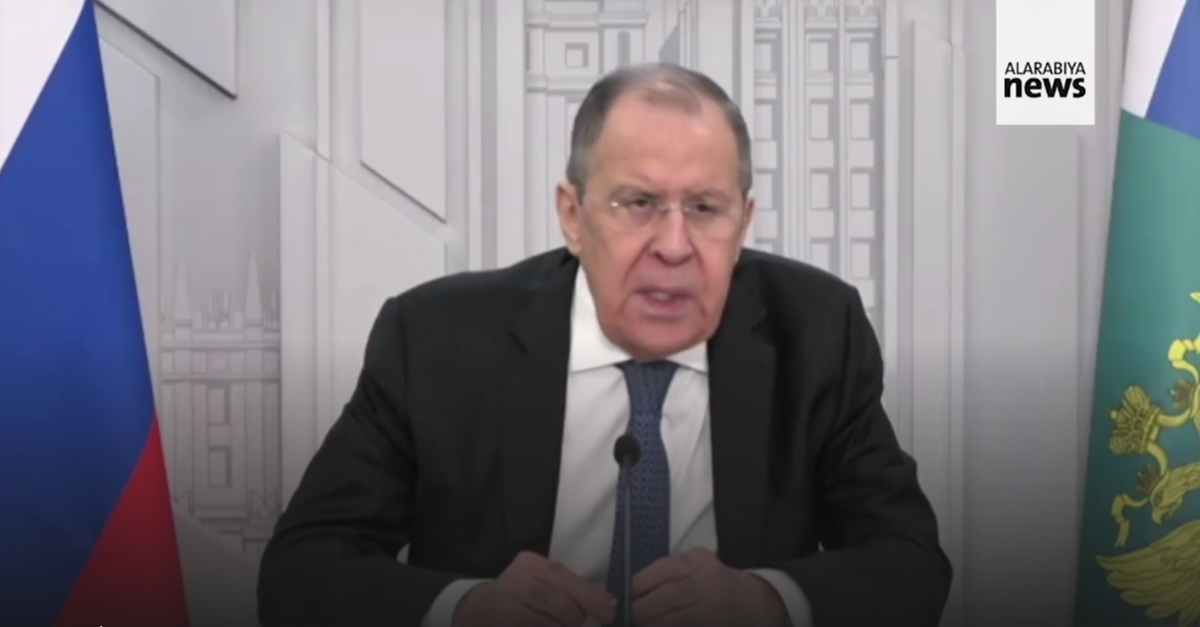DUBAI: Moscow does not consider itself to be at war with NATO, but NATO does, Russia’s Foreign Minister Sergey Lavrov has told Al-Arabiya in an exclusive interview.
He brushed aside UN chief Antonio Guterres’ proposals for humanitarian assistance and evacuation of civilians, saying: “There is no need for anybody to provide help to open humanitarian corridors. There is only one problem … humanitarian corridors are being ignored by Ukrainian ultranationalists.
“We appreciate the interest of the secretary-general to be helpful … (We have) explained … what is the mechanism for them to monitor how the humanitarian corridors are announced.”
Asked about the risks of war spilling into Moldova after a series of explosions rattled a breakaway border region within the country, Lavrov said: “Moldova should worry about its own future … because they are being pulled into NATO.”
In an hour-long interview with Talal Al-Haj, Al-Arabiya news channel’s New York/UN bureau chief, which aired on Friday night, Lavrov offered the Russian government’s perspective of the Ukraine conflict, which is now into its third month, having already claimed tens of thousands of lives, civilians as well as soldiers, on both sides.
“Unfortunately, NATO, it seems, considers itself to be at war with Russia,” he said. “NATO and EU leaders, many of them, in England, in the US, Poland, France, Germany and of course EU chief diplomat Josep Borrell, they bluntly, publicly and consistently say, ‘Putin must fail, Russia must be defeated.’ When you use this terminology, I believe you think that you are at war with the person who you want to be defeated.”

The Russian government has said its “special military operation” in Ukraine is aimed at protecting Russia’s security and that of Russian-speaking people in the eastern Donbas region. Western nations have accused Russia of invading a sovereign country and of committing war crimes.
Since the invasion began on February 24, the US, UK and EU have sanctioned more than 1,000 Russian individuals and businesses and wealthy businessmen, with the US banning all Russian oil and gas imports.
The financial measures are designed to damage Russia’s economy and penalize President Vladimir Putin, high-ranking officials, and people who have benefited from his rule.
Lavrov said: “To believe that this latest outrage and the wave of sanctions, which eventually showed the real face of West which, as far as I now understand, has always been Russian-phobic, to believe that this latest wave of sanctions is going to make Russia cry uncle and to beg for being pardoned, those planners are lousy and of course they don’t know anything about foreign policy of Russia and they don’t know anything about how to deal with Russia.”
Full 1 hour Exclusive on @Alarabiya @AlHadath w/ Mr. Sergey Lavrov, FM of the Russian Federation.
The special fast paced Excl. was broadcast in English covering a lot of ground. It was full of headlines, hot exchanges & even a couple of good Russian jokes!https://t.co/OiT3HVfqTD pic.twitter.com/641LlfoxH0— Talal Al-Haj (@TalalAlhaj) April 30, 2022
The conflict has prompted NATO members and allies to pledge billions of dollars in military support to Ukraine. Weapons systems being supplied to Ukrainian forces include surface-to-air missiles, heavy artillery and surveillance equipment.
The Biden administration has agreed with Western allies to hold monthly meetings to assess the needs of the government in Kyiv, raising fears that the war in Ukraine will, as NATO Secretary General Jens Stoltenberg put it, “drag on and last for months and years.”
NATO says it will do all that it can to support Ukraine while ensuring that the war does not spill over beyond its borders into neighboring countries.
But Lavrov said that NATO’s cooperation with Ukraine was little more than “an instrument to contain Russia and deter Russia and irritate Russia.”
He said that Russia knew the routes being used to supply Ukraine with arms, and “as soon as these weapons are reaching Ukrainian territory, they are fair game for our special operation.”
Lavrov said Russia has put forward many proposals to end the war in Ukraine but drawn a blank so far. Ukraine was at fault for the stalled peace talks, he said, blaming what he said was the government’s changing negotiating positions.
Russia has accused the Pentagon of funding and developing biological weapons in a number of laboratories across Ukraine. In January this year, the US denied the accusations and claimed that the laboratories are there to “reduce the threat of biological weapons proliferation.” Lavrov categorically rejected the US assertions.
Lavrov also accused the West of sabotaging the peace attempts, claiming that negotiations in Istanbul last month had been progressing on issues of Russian territorial claims and security guarantees until Ukrainian diplomats backtracked at the behest of the West.
“We are stuck because of their desire to play games all the time,” he said. “Because of the instructions (the Ukrainian representatives) get from Washington, from London, from some other capitals, not to accelerate the negotiations.”
Lavrov reiterated the Putin government’s position that Russia’s “special military operation” in Ukraine is aimed at protecting the two self-proclaimed republics of Donetsk and Luhansk in Donbas.
“The goal of our operation, it was announced openly, is to protect these two republics and to make sure that no threat will ever emanate from the Ukrainian territory to the security of these people and to security of the Russian Federation,” he said.
In late February, President Putin recognized the region, allowing Russian troops to be present in those territories. Russia has been aiming to protect the two republics because “they have been under attack from the Ukrainian regime for a long, long eight years,” Lavrov said.

“When the coup happened in 2014, they said they don’t want to have anything to do with these people who came to power illegally and they said, ‘leave us alone, we want to understand what is going on.’ They never attacked the rest of Ukraine.”
Lavrov was referring to the overthrow of pro-Russian President Viktor Yanukovych in February 2014 after months of protests in Kyiv’s Independence Square, or Maidan, against his refusal to sign an agreement that would have integrated Ukraine more closely with the EU.
Around the same time, Russia annexed the Crimean peninsula from Ukraine and threw its support behind the Donbas insurgency. Since then, Donetsk and Luhansk have been controlled by separatist governments backed by Moscow.
“The (leaders of the Donetsk and Luhansk republics) were (proclaimed) terrorists, an anti-terrorist operation was launched by the butcher leader who came to power by force through illegal means, and for eight long years they have been victims of Ukrainian aggression, killing like 13,000 or 14,000 civilians, destroying civilian infrastructure and many, many other crimes were committed by the Ukrainian regime against them,” Lavrov said.
He said that Russia’s “special operation” was a “response to what NATO was doing in Ukraine to prepare this country for a very aggressive posture against the Russian Federation.”
Referring to the Ukraine government he said: “They were given offensive arms, including the arms which can reach the Russian territory, military bases were being built, including on the Sea of Azov, and many dozens of military exercises, many of them on Ukrainian territory, were conducted under NATO auspices.
“Most of these exercises were designed against the interests of the Russian Federation, so the purpose of this operation is to make sure that those plans do not materialize.”
Tracing the roots of the Ukraine conflict, Lavrov said: “During all these years we have been initiating draft treaties, draft agreements with NATO, with countries of the Organization of Security and Cooperation in Europe and lately in December last year we proposed another initiative to the US and to NATO to conclude treaties with both of them on security guarantees to all countries in the Euro-Atlantic space without joining any military alliance.”

He was referring to the OSCE, the regional security-oriented intergovernmental organization with observer status at the UN whose mandate includes issues such as arms control, promotion of human rights, freedom of the press, and free and fair elections.
“Every time we initiated these steps, they were basically rejected with more or less polite behavior. In 2009, we proposed the European Security Treaty which NATO refused to consider and the treaty actually was about codifying something to which all OSCE countries subscribed at the top level.”
According to Lavrov, Russia had suggested that countries be given the right to choose their alliances and not to strengthen their security at the expense of the security of another country, meaning that “no single organization in Europe can pretend to be a dominant player in this geopolitical space.”
Lavrov said NATO responded to Russia by saying that there would be no legally binding security guarantees outside NATO, which he believes makes the OSCE “just lip service.”
He said that the last such attempt by Russia took place in December 2021, before launching the operation in Ukraine, as a response to the “increasing tension and confrontation” over the years.
This Russian initiative, according to Lavrov, was rejected by NATO because it did not want to sacrifice its “open doors policy,” which “does not exist in the Washington Treaty (which forms the basis of NATO)” and used as a “cover to promote NATO expansionist plans.”
“NATO, despite its promises and promises of its leaders, was moving closer and closer to the Russian border and they were telling us, ‘Don’t be afraid, we are a defensive alliance and we will pose no threat to your security.’”
He acknowledged that NATO was a defensive alliance when there was a Berlin Wall and a “geopolitical wall between NATO and the Warsaw Pact” after World War II.
But “when the Warsaw Pact disappeared, when the Soviet Union ceased to exist, NATO decided that the line of defense should be moved to the east and they did move this line of defense five times.”
“Foreign Secretary of Britain Liz Truss one of these days stated that NATO must be a global player so we can listen for so many times about the defensive nature of this alliance but this is a lie.”
Lavrov accused the Ukraine government of “cancelling everything Russian,” including “the language, education, media and day-to-day use of the Russian language was made an administrative offense.”
Elaborating on the accusation, he said: “The Ukrainian regime intensified, at the end of last year and early this year, shelling of the eastern territories of the country in Donbas, in the worst violations of the Minsk Agreements which were signed in February 2015 and endorsed by the Security Council resolution. When they were targeting civilians and civilian infrastructure, schools, hospitals, kindergartens, we didn’t have any other choice.”
Lavrov cautioned that his remarks that the risks of a nuclear conflict should not be “underestimated” if the US and its allies continued to arm Ukraine should not be taken out of context.
“We were never playing with such dangerous things. We all should insist on the statements made by the P5 (UN Security Council permanent members), that never ever there could be a nuclear war. But to make sure that this is the case, the West must discipline speakers like our Ukrainian and Polish colleagues, who see no danger in playing with such very, very risky words.”
Lavrov said Western media outlets were misconstruing his words but “we are used to it.”



























